Read more about Newly-discovered chemical reactions could explain how life began on Earth on Devdiscourse.



Circa 2020 Reversing the biological clock to essentially reverse aging.
Expression of three Yamanaka transcription factors in mouse retinal ganglion cells restores youthful DNA methylation patterns, promotes axon regeneration after injury, and reverses vision loss in a mouse model of glaucoma and in aged mice, suggesting that mammalian tissues retain a record of youthfu…
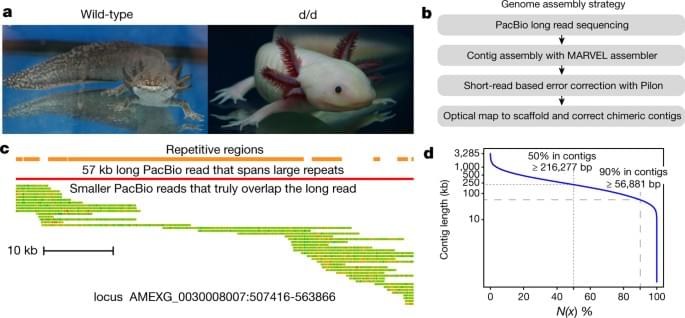
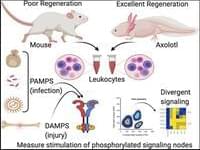
Circa 2021 This article states that humans have possibly an untapped regeneration ability and they may have found it in mice.
Using new phospho-flow cytometry techniques to measure signaling in individual cell subsets we compared mouse to salamander inflammation. These studies demonstrated evolutionarily conserved responses to PAMP ligands through toll-like receptors (TLRs) but identified key differences in response to DAMP ligands. Co-exposure of macrophages to DAMPs/PAMPs suppressed MAPK signaling in mammals, but not salamanders, which activate sustained MAPK stimulation in the presence of endogenous DAMPS.
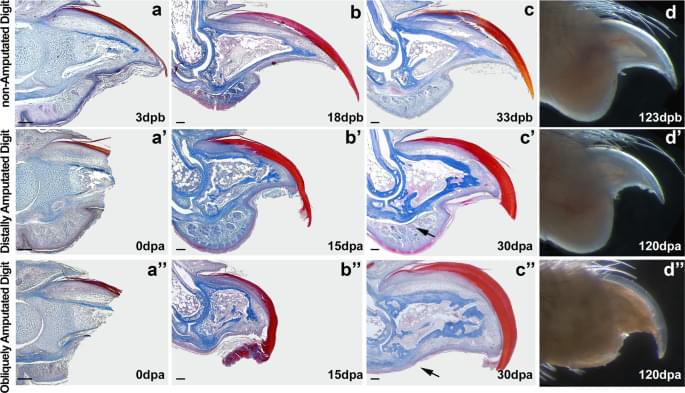
The main structure shaping the mouse digit tip in size and form is the terminal phalangeal bone (Fig. Supl. 1). As all long bones, the terminal phalanx is formed during embryonic development through endochondral ossification, resulting in longitudinal growth, and through the process of appositional ossification, resulting in peripheral growth13. Differently from all long bones, the length of the distal phalanx is further increased by an additional ossification center located at the distal tip of the bone, through intramembranous ossification13,14. Estimations point that 55% of the postnatal elongation of the distal phalanx of mice is a consequence of this distal process13. One study showed that although distal amputation eliminates part of the terminal phalanx formed by endochondral ossification, bone regrowth after amputation is exclusively due to distal intramembranous ossification13. Similar to bone formation by intramembranous ossification during development or after injury16, bone regrowth after distal amputation of the mouse digit tip depends on Wnt signaling17.
Re-establishment of homeostasis and nail and bone regrowth are expected to occur naturally after digit tip lesions. However, the formation of a blastema, which is a hallmark of epimorphic regeneration in salamanders, has been largely discussed in mammals7,9,18,19,20,21,22. The search for a mammalian blastema is sustained by the idea that, as in salamanders, tissue-specific cells, or stem/progenitor cells, would respond to the distal amputation lesion, migrating to a central distal-most region of the digit, creating the multi-tissue structure comprising the regenerating digit. A study in mice17 shows that as in salamanders, each tissue comprising the regenerated digit is formed by tissue-specific stem cells residing in the tissues preserved after amputation, suggesting that trans-differentiation does not occur in amputated mouse digit tip. However, it is not known whether these stem cells are integrating a regenerative blastema induced by the distal amputation or simply generating more tissue through endogenous tissue repair responses.
In this study, we compared digit regenerative capacity after distal and proximal amputation and propose a hypothetical mechanism by which digits are able to regain a morphology that is close to normal after distal amputations but fails when amputations are performed proximally. While most tissues re-establish homeostasis in very similar ways in distal and proximal amputated digits, bone growth is only observed after distal amputations. Observing the regions affected by each amputation plan, we propose that the main difference between these two amputation plans is the elimination of osteogenic signals and precursor cells in proximally amputated digits. In distally amputated digits, the source of osteogenic signal emanating from the nail17 and the presence of osteoprogenitor cells in the periosteum23 could be sufficient to promote bone growth and give the digit a new tip.
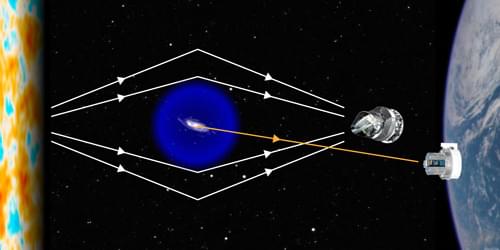
Gravitational lensing of the cosmic microwave background has been used to probe the distribution of dark matter around some of the earliest galaxies in the Universe.
Investigating the properties of galaxies is fundamental to uncovering the still-unknown nature of the dominant forms of mass and energy in the Universe: dark matter and dark energy. Dark matter resides in “halos” surrounding galaxies, and information on the evolution of this invisible substance can be obtained by examining galaxies over a wide range of cosmic time. But observing distant galaxies—those at high redshifts—poses a challenge for astronomers because these objects look very dim. Fortunately, there is another way to probe the dark matter around such galaxies: via the imprint it leaves on the pattern of cosmic microwave background (CMB) temperature fluctuations through gravitational lensing (Fig. 1).

Most measurements of Newton’s gravity constant use stationary masses, but a new experiment measures the constant with wiggling metal beams.
Researchers at the University of Massachusetts Amherst recently announced that they have figured out how to engineer a biofilm that harvests the energy in evaporation and converts it to electricity. This biofilm, which was announced in Nature Communications, has the potential to revolutionize the world of wearable electronics, powering everything from personal medical sensors to personal electronics.
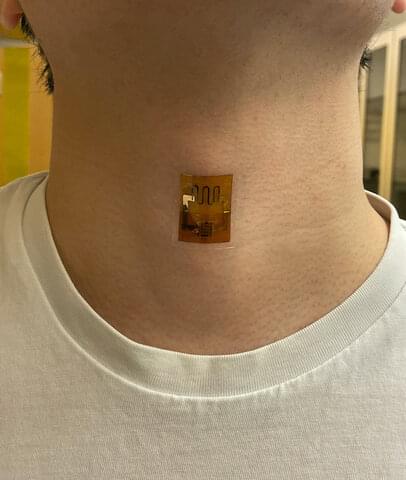
Researchers have reported the discovery of an exoplanet orbiting Ross 508 near the inner edge of its habitable zone.
Researchers at the University of Massachusetts Amherst recently announced that they have figured out how to engineer a biofilm that harvests the energy in evaporation and converts it to electricity. This biofilm, which was announced in Nature Communications, has the potential to revolutionize the world of wearable electronics, powering everything from personal medical sensors to personal electronics.
“This is a very exciting technology,” says Xiaomeng Liu, graduate student in electrical and computer engineering in UMass Amherst’s College of Engineering and the paper’s lead author. “It is real green energy, and unlike other so-called ‘green-energy’ sources, its production is totally green.”
That’s because this biofilm —a thin sheet of bacterial cells about the thickness of a sheet of paper—is produced naturally by an engineered version of the bacteria Geobacter sulfurreducens. G. sulfurreducens is known to produce electricity and has been used previously in “microbial batteries” to power electrical devices. But such batteries require that G. sulfurreducens is properly cared for and fed a constant diet. By contrast, this new biofilm, which can supply as much, if not more, energy than a comparably sized battery, works, and works continuously, because it is dead. And because it’s dead, it doesn’t need to be fed.

Researchers have reported the discovery of an exoplanet orbiting Ross 508 near the inner edge of its habitable zone.
Researchers have uncovered a list of 3,207 mobile apps that are exposing Twitter API keys in the clear, some of which can be utilized to gain unauthorized access to Twitter accounts associated with them.
The takeover is made possible, thanks to a leak of legitimate Consumer Key and Consumer Secret information, respectively, Singapore-based cybersecurity firm CloudSEK said in a report exclusively shared with The Hacker News.
“Out of 3,207,230 apps are leaking all four authentication credentials and can be used to fully take over their Twitter Accounts and can perform any critical/sensitive actions,” the researchers said.

A 24-year-old Australian hacker has been charged with developing and selling the “Imminent Monitor” spy software to more than 14,500 people.
Critical Security Vulnerabilities In Netgear Business Routers Which The Netgear Team Can’t Fix. Stop Using These Routers As Soon As Possible — Vulnerabilities — Information Security Newspaper | Hacking News.